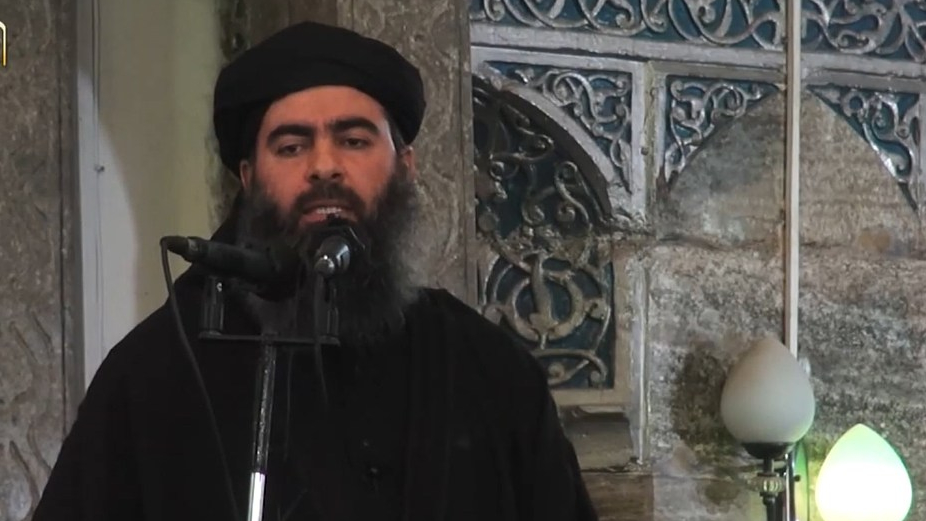
ISIL leader Abu Bakr al-Baghdadi appears for the first time in five years in a video released by his group in April 2019. It is unclear when the footage was filmed. /VCG Photo
ISIL leader Abu Bakr al-Baghdadi appears for the first time in five years in a video released by his group in April 2019. It is unclear when the footage was filmed. /VCG Photo
Editor's note: Andrew Korybko is a Moscow-based American political analyst. The article reflects the author's opinions, and not necessarily the views of CGTN.
U.S. President Donald Trump has confirmed that ISIL leader Abu Bakr al-Baghdadi was killed in a weekend raid carried out by U.S. special forces near the northwestern Syrian city of Idlib, thus putting an end to the terrorist leader's reign that had immensely weakened over the past several years since the onset of Russia's decisive anti-terrorist campaign in the Arab Republic.
The world should celebrate his demise, but no one appears to be happier about this than Trump, who hopes to take advantage of this development in order to improve America's standing in the region following the controversy that erupted after its abrupt military drawdown in northeastern Syria and his own domestic political image ahead of next year's heated elections.
By targeting al-Baghdadi's killing and having American special forces successfully pull it off, Trump can double down on his narrative that this terrorist group has been defeated in Syria and its desire to create a so-called "caliphate" there has been thwarted.
Through the combined efforts of the Syrian Arab Army and its Russian, Iranian, and Hezbollah anti-terrorist allies that it legally invited into the country, this tremendous feat was achieved, not through the illegal bombing campaign of the U.S.-led coalition whose only "success" was turning the city of Raqqa into rubble and worsening the humanitarian crisis in that part of the country.
Still, Trump believes that his narrative could help recover some of the soft power losses that his country experienced after being accused of selling out the Kurds upon abruptly scaling back its military presence in Syria.

An image grab taken from a propaganda video released on July 5, 2014, by al-Furqan Media allegedly shows the leader of the ISIL, Abu Bakr al-Baghdadi, addressing Muslim worshippers at a mosque in the militant-held northern Iraqi city of Mosul. /VCG Photo
An image grab taken from a propaganda video released on July 5, 2014, by al-Furqan Media allegedly shows the leader of the ISIL, Abu Bakr al-Baghdadi, addressing Muslim worshippers at a mosque in the militant-held northern Iraqi city of Mosul. /VCG Photo
In addition, Trump can now justify his plans to further reduce the Pentagon's footprint there on the basis that the original intent of the mission (which was to destroy ISIL) has been achieved so there isn't any real reason to continue spending taxpayer funds to stay there, unless, of course, he's serious about controlling its oil like he previously tweeted about.
This might play well to his domestic audience and especially his base, who could become energized because he's seemingly keeping his campaign promises and pulling America out of what he regularly describes as "endless wars," particularly if it can profit from controlled Syrian oil while doing so.
The question thus becomes one of whether al-Baghdadi's death is more of a public relations opportunity for the U.S. than a substantial anti-terrorist success in its own right, which certainly appears to be the case. Again, it can't be reiterated enough that it's indeed a positive development that the leader of the world's most notorious terrorist group was just killed but his death does not mean the end of ISIL nor fights against terrorism.
ISIL is still a threat, albeit not the same conventional "caliphate" – creating one that it originally was during its 2014-2015 heyday, having since reverted to a mostly unconventional challenge via the terrorist network's decentralization into what some experts have described as "regional franchises" such as those that have popped up in West Africa and Afghanistan.
Al-Baghdadi might have symbolically inspired some of the newest terrorist recruits, but it was more the brief period of the so-called "caliphate's" creation that probably inspired them much more, so his death isn't likely going to change ISIL's appeal to its core radicalized audience.
Therefore, the international community mustn't let its guard down by falling on his death as it's not the end of the war on terror. On the contrary, though the page has turned and a new chapter has begun, the story is far from over. Terrorism still remains one of the greatest threats to the world even if it changes its form after al-Baghdadi's death, so the world must remain alert at all times.
(If you want to contribute and have specific expertise, please contact us at opinions@cgtn.com.)